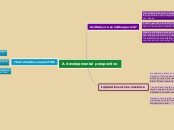by Paloma Rodriguez 8 years ago
278
A developmental perspective
The development of a child's brain is highly influenced by early experiences, which play a crucial role in determining which neurons are activated and which may deteriorate if unused.

by Paloma Rodriguez 8 years ago
278

More like this